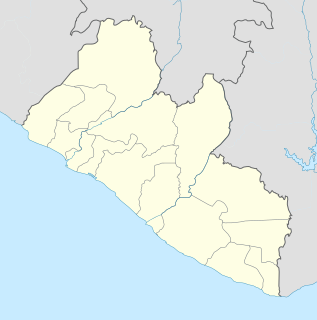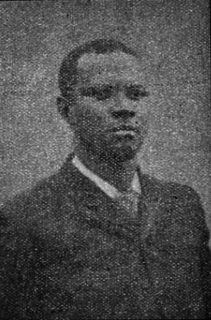
The Twenty-fourth Amendment of the United States Constitution prohibits both Congress and the states from conditioning the right to vote in federal elections on payment of a poll tax or other types of tax. The amendment was proposed by Congress to the states on August 27, 1962, and was ratified by the states on January 23, 1964.
Elections in South Africa are held for the National Assembly, provincial legislatures and municipal councils. Elections follow a five-year cycle, with national and provincial elections held simultaneously and municipal elections held two years later. The electoral system is based on party-list proportional representation, which means that parties are represented in proportion to their electoral support. For municipal councils there is a mixed-member system in which wards elect individual councillors alongside those named from party lists.

Buchanan is the third largest city in Liberia, lying on Waterhouse Bay, part of the Atlantic Ocean. It is referred to as Gbezohn in the local Bassa language. As of the 2008 census, Buchanan has a population of 34,270. Of this, 16,984 were male and 17,286 female.

The Unity Party (UP) is a political party in Liberia that was started in 1984 by Edward B. Kesselly, also its first standard bearer. Officially founded at Buchanan in Grand Bassa County, the party was established on 27 July 1985. The Unity Party participated in the first elections after the 1980 coup, running against President Samuel Doe in October 1985. The party has remained active in Liberian politics since and was, until 2017, the ruling party.

The 1997 Liberian general election was held on 19 July 1997 as part of the 1996 peace agreement ending the First Liberian Civil War. The presidency, as well as all seats in the House of Representatives and the Senate were up for election. Voter turnout was around 89%. Former rebel leader Charles Taylor and his National Patriotic Party (NPP) won the election by a substantial margin; Taylor won 75.3% of the vote in the presidential election, whilst the NPP won the same number of votes in the parliamentary election. Taylor was inaugurated as president on 2 August 1997.
Charles Walker Brumskine is a Liberian politician and attorney. He is the leader of the Liberty Party and came third in the 2005 presidential election. He challenged incumbent Ellen Johnson-Sirleaf for the Presidency in 2011. He is also the senior partner of Brumskine & Associates, a leading Liberian law firm.

The Legislature of Liberia is the bicameral legislature of the government of Liberia. It consists of a Senate – the upper house, and a House of Representatives – the lower house, modeled after the United States Congress. Sessions are held at the Capitol Building in Monrovia. Legislature of Liberia is considered one of the three branches of government based on the Article III of the Constitution of Liberia that stipulates all three branches ought to be equal and coordinated based on the Principle of checks and balances.

The House of Representatives is the lower chamber of the bicameral legislative branch of Liberia, and together with the Senate comprises the Legislature of Liberia. The number of seats is fixed by law at 73, with each county being apportioned a number of seats based on its percentage of the national population. House members represent single-member districts within the counties drawn up by the National Elections Commission and serve six-year terms. The House meets at the Capitol Building in Monrovia.

Edina is a city in District 1 of Grand Bassa County, Liberia. Located on the central portion of the Atlantic Coast of Liberia on the north shore of the mouth of the St. John River, it is about 3.5 miles (5.6 km) north of Grand Bassa’s capitol of Buchanan. Settled in 1832, the current mayor of Edina is Etweda Cooper and the City's Senior Councilman is James W. Johnson. The community is named after Edinburgh, Scotland, which provided monetary support for the foundation of the settlement.

The Constitution of Liberia is the supreme law of the Republic of Liberia. The current constitution, which came into force on 6 January 1986, replaced the Liberian Constitution of 1847, which had been in force since the independence of Liberia. Much like the 1847 Constitution, the Constitution creates a system of government heavily modeled on the Federal Government of the United States.

A constitutional referendum was held in the Republic of the Congo on 20 January 2002, with results showed over 87% voted in favour with a voter turnout of 77.5%.

The 2011 Liberian general election was held on 11 October 2011, with a presidential runoff election held on 8 November 2011. The presidency, as well as all seats in the House of Representatives and half of the seats in the Senate, were up for election. The election was overseen by the National Elections Commission (NEC).

An independence referendum was held in the Comoros on 22 December 1974. The overall result was a strong "yes" vote, with 94.57% of voters voting for independence and almost all the "no" votes being cast in Mayotte, where there was a majority for remaining under French control. In contrast, on Mohéli only five out of 6,059 votes were against independence. Voter turnout was 93.3%.

A referendum to amend the Constitution of Liberia was held on 23 August 2011. Voters chose whether to ratify four amendments regarding judge tenure, elections scheduling, presidential candidate requirements and the electoral system. The National Elections Commission of Liberia (NEC) oversaw the referendum.

General elections were held in Liberia on 7 October 1975, alongside a simultaneous referendum on presidential term limits. In the presidential election, incumbent William Tolbert of the True Whig Party was the only candidate, and was re-elected unopposed. In the legislative elections True Whig Party candidates won all 71 seats in the House of Representatives and all 18 seats in the Senate unopposed. Voter turnout was around 80%.

Joseph D. Summerville served as the 15th Vice President of Liberia from 1902 until his death in 1905 under Presidents Garretson W. Gibson and Arthur Barclay, making him the only person to serve as vice president under two separate presidents.
A constitutional referendum was held in Maryland Colony on 29 March 1854. The new constitution was approved by voters and general elections were subsequently held on 15 May, before independence was declared on 8 June.

A constitutional referendum was held in Liberia on 4 May 1943, alongside general elections. The changes to the constitution required the president to be a Liberian citizen by birth or to have lived in Liberia for at least 25 years, as well as allowing constitutional referendums to be held separately from general elections. The changes were approved by voters.

Legislative elections were held in Liberia on 1 December 1840.











